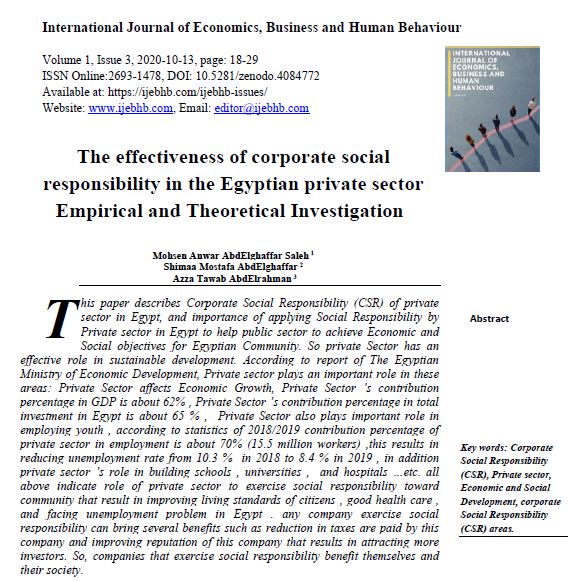The effectiveness of corporate social responsibility in the Egyptian private sector Empirical and Theoretical Investigation
Abstract
This paper describes Corporate Social Responsibility (CSR) of private sector in Egypt, and importance of applying Social Responsibility by Private sector in Egypt to help public sector to achieve Economic and Social objectives for Egyptian Community. So private Sector has an effective role in sustainable development. According to report of The Egyptian Ministry of Economic Development, Private sector plays an important role in these areas: Private Sector affects Economic Growth, Private Sector ’s contribution percentage in GDP is about 62% , Private Sector ’s contribution percentage in total investment in Egypt is about 65 % , Private Sector also plays important role in employing youth , according to statistics of 2018/2019 contribution percentage of private sector in employment is about 70% (15.5 million workers) ,this results in reducing unemployment rate from 10.3 % in 2018 to 8.4 % in 2019 , in addition private sector ’s role in building schools , universities , and hospitals …etc. all above indicate role of private sector to exercise social responsibility toward community that result in improving living standards of citizens , good health care , and facing unemployment problem in Egypt . any company exercise social responsibility can bring several benefits such as reduction in taxes are paid by this company and improving reputation of this company that results in attracting more investors. So, companies that exercise social responsibility benefit themselves and their society.
Downloads
References
Murray, K., Vogel, C. (2007). “Using a Hierarchy-of-Effects to Gauge the Effectiveness of Corporate Social Responsibility to Generate Goodwill toward the Firm: Financial versus Nonfinancial Impacts”, Journal of Business Research, Vol. 38, 2/2007, pp.141-159.
Suchman, M.C. (1995). “Managing legitimacy: Strategic and institutional approaches”. Academy of Management Journal, 20(3), 571-610.
Cahya, B.A. (2010). “Analysis of Effect of Financial Performance against Corporate Social Responsibility (Study on Bank in Palestine Period 2007-2008)”. Semarang: Faculty of Economics, University of Diponegoro.
Koton D. Limits to Social Responsibility of Business. The People Centered Development Forum (PCP) Article # 19, Release Date June 1, 1996.
Ministry of Economic Development, Indicators of social and economic performance during the second quarter, 2008/2009.
The Egyptian Central Bank, the monthly statistical bulletin, no.124, Jan.2009
United Nations Development program, Business sector Solutions for Human Development, Egypt 2007, page 33.
Qureshi, M.I., Rustum, A., Rustum, S., Omar, A.B., Zaman, K. (2013). “Factors influencing customer satisfaction in banking sector of Pakistan. Report and Opinion”, 5(2), 35-39.
O’Donovan, G. (2000). “Environmental disclosures in the annual report: Extending the applicability and predictive power of legitimacy theory. Accounting, Auditing and Accountability”, 15(3), 344-371.
Hadi, N. (2011). “Corporate Social Responsibility”. Yogyakarta: Graha Ilmu.
Husnan, A. (2013), Influence of Corporate Social Responsibility Disclosure against Financial Performance. Semarang: Faculty of Economics and Business, University of Dipenogoro.
Drever, M., Stanton, P., McGowan, S. (2007). “Fundamental Properties of Reporting Information, in Contemporary Issues in Accounting". P7-36.
Fitriyani, F. (2012). “Environmental Performance, Disclosure of Corporate Social Responsibility and Financial Performance”.
Resturiyani, N. (2012). “Influence of Corporate Social Responsibility Disclosure of Financial Performance” (Study on Mining Company Listed in Palestine Stock Exchange in 2011). Bandung: Faculty of Economics Universtas Pasundan.
Branco, C.M. and Rodrigues, L.L. (2008). ‘‘Social responsibility disclosure: a study of proxies for the public visibility of Portuguese banks’’, The British Accounting Review, Vol. 40, pp.161-81.
Gray R (2010). “Is accounting for sustainability actually accounting for sustainability...and how would we know? An exploration of narratives of organizations and the planet”. Account Org Soc 35(1):47–62.
Dyllick T, Hockerts K (2002). “Beyond the case for corporate sustainability”. Bus Strat Environ 11:130–141.
Javed, S., Malik, A., & Alharbi, M. M. H. (2020). The relevance of leadership styles and Islamic work ethics in managerial effectiveness. PSU Research Review.
Ahmed Nazify, second conference on corporate social responsibility "Investment and practices of responsible work ", managers center, ministry of investment, Cairo, 23 march, 2009, page 6.
Central Agency for public Mobilization and statistics, bulletin of consumer Records March 2009.












